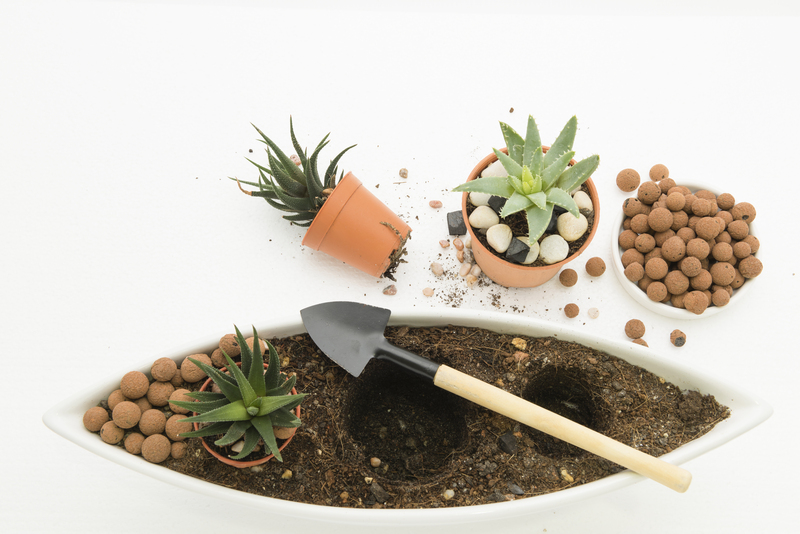Balcony Vegetable Gardening Tips
Posted on 15/12/2024
Are you eager to transform your balcony into a vibrant vegetable garden? With a bit of planning and the right techniques, you can grow fresh produce right outside your door. Balcony vegetable gardening can be both a therapeutic hobby and a source of fresh, organic veggies. Here are some tips to get you started.
Choosing the Right Containers
The foundation of successful balcony gardening begins with selecting the appropriate containers. Opt for pots that have good drainage and are of an adequate size to accommodate the root systems of the plants you'll be growing. Terra-cotta pots, grow bags, and even upcycled containers can work wonders.

Soil Selection
The soil quality greatly impacts the health of your plants. A high-quality potting mix that's light and well-draining is ideal. Avoid garden soil as it can be too compact and may not drain well in containers. You can enhance the soil with organic compost to ensure your plants receive essential nutrients.
Sunlight Exposure
Most vegetables require at least 6-8 hours of sunlight daily. Assess the light patterns on your balcony and organize your plants accordingly. South or west-facing balconies typically receive the most sunlight. If your balcony has a limited light supply, consider growing shade-tolerant vegetables like lettuce, spinach, and swiss chard.
Watering Techniques
Proper watering can make or break your balcony garden. Containers dry out faster than garden beds, so regular watering is crucial. Install a self-watering system or use a watering can with a fine spout to ensure even distribution. Always check the soil moisture before watering to avoid overhydration, which can lead to root rot.
Plant Selection
Choose vegetables that are well-suited for container growth. Cherry tomatoes, bell peppers, leafy greens, herbs, and dwarf varieties of beans and peas are excellent choices. Avoid large vegetable varieties, unless you have ample space and large containers.
Pest Control
Balconies may be less prone to pests than traditional gardens, but vigilance is essential. Regularly inspect your plants for any signs of insects or disease. Use natural pest control methods such as neem oil, insecticidal soap, or introducing beneficial insects like ladybugs to manage harmful pests.
Fertilizing Your Plants
Balcony gardens may need regular fertilization due to the limited nutrient supply in containers. Use a balanced organic fertilizer every two to four weeks during the growing season. Monitor your plants for signs of nutrient deficiency such as yellowing leaves or stunted growth and adjust your fertilizing schedule accordingly.
Seasonal Considerations
Understand the growing seasons and plant accordingly. Cool-season vegetables like kale and broccoli thrive in spring and fall, while warm-season crops like tomatoes and cucumbers do best in the summer. Consider starting seedlings indoors to extend your growing season.
Vertical Gardening
Maximize your balcony space by growing vertically. Use trellises, hanging baskets, and vertical planters to make the most of the available area. This is particularly useful for vining plants like beans, peas, and certain varieties of tomatoes.
Maintenance and Pruning
Regular maintenance keeps your garden healthy and productive. Remove dead or yellowing leaves, pinch off flowers to encourage bushier growth, and prune vegetable plants like tomatoes to enhance airflow. Staying on top of maintenance tasks will ensure a thriving garden.
Pros and Cons of Balcony Vegetable Gardening
Pros
- Access to fresh and organic vegetables right outside your door.
- Allows gardening in urban areas where traditional garden space is unavailable.
- Promotes a sustainable lifestyle and reduces the carbon footprint.
- Therapeutic and stress-relieving hobby.
- Educational experience for children and adults alike.
Cons
- Limited space can restrict the variety and quantity of vegetables grown.
- Requires regular maintenance, watering, and pest monitoring.
- May require investment in quality containers, soil, and tools.
- Not all vegetables are suitable for container growth.
Quick Tips for Successful Balcony Gardening
- Start with easy-to-grow vegetables like herbs, lettuce, or cherry tomatoes.
- Rotate your plants periodically to ensure even sunlight exposure.
- Install a small compost bin to recycle kitchen waste and enrich your soil.
- Group plants with similar water and light needs together.
- Use mulch to retain soil moisture and reduce the need for frequent watering.

Takeaways
Balcony vegetable gardening is a rewarding endeavor that brings fresh produce and a touch of nature to urban living. By selecting the right containers, soil, and plants, and following essential maintenance tips, even a small balcony can yield a significant harvest.
Conclusion
Balcony vegetable gardening is both a practical and enjoyable way to engage in urban agriculture. By considering factors such as container choice, soil quality, sunlight exposure, and proper maintenance, you can create a lush, productive garden in even the smallest spaces. Embrace the journey of growing your own vegetables and enjoy the bountiful rewards it brings.
Latest Posts
Top Tips for Cleaning Your Patio and Paving Like a Pro
Easy Steps to Sharpen Your Garden Shears Without Leaving Home
Inspiring Concepts to Cultivate Your Own Zen Garden Sanctuary




